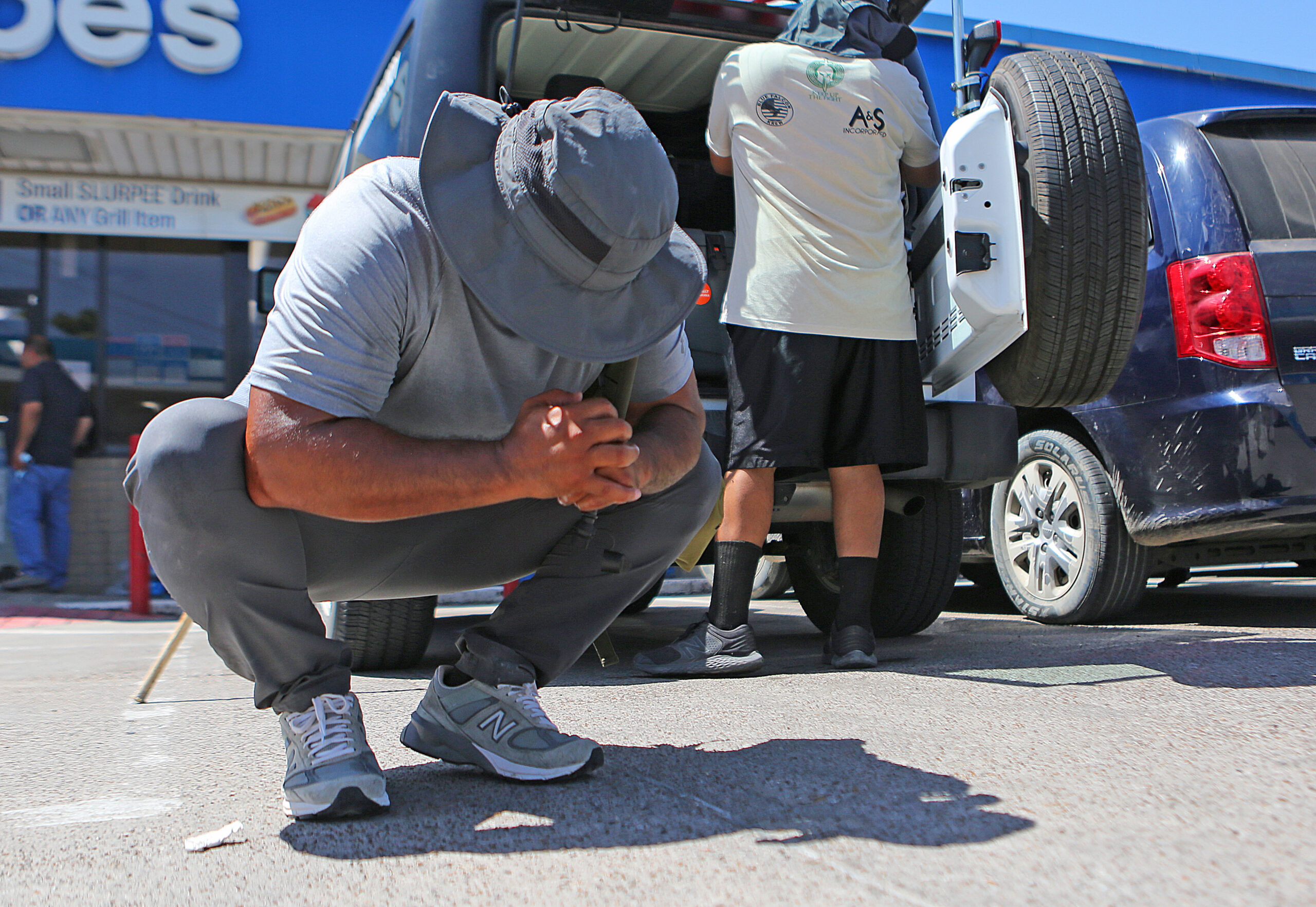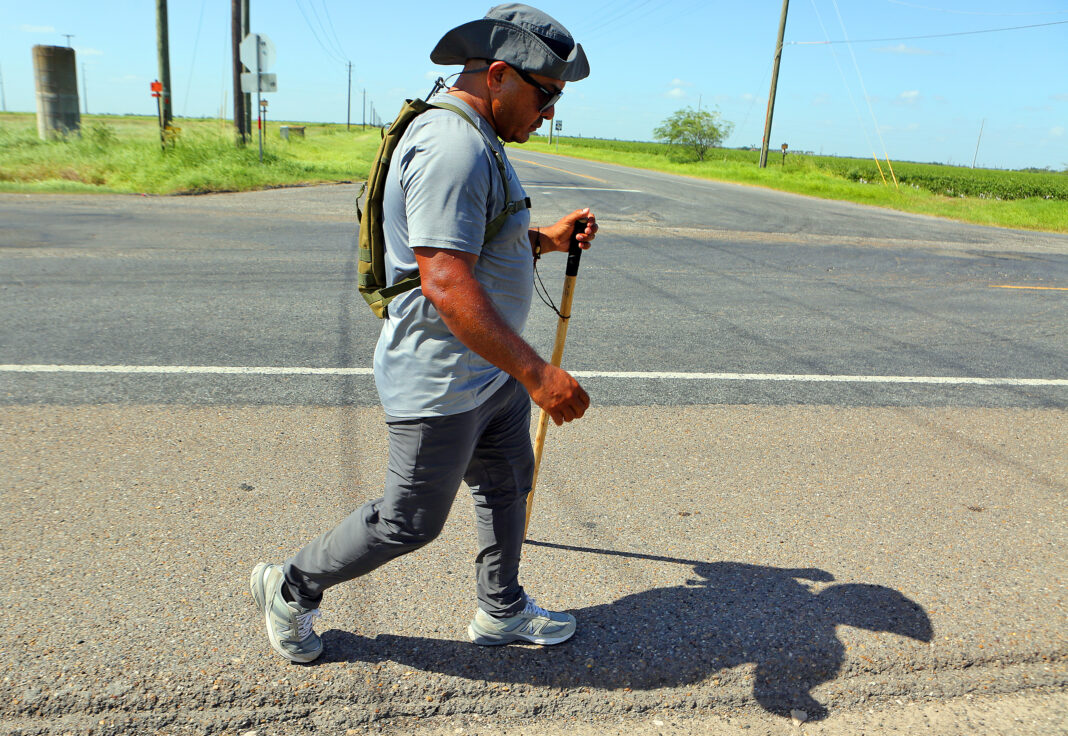BOCA CHICA BEACH — People began exiting the vehicles parked along Boca Chica Boulevard as Ramon Castro inched closer to the beach, completing the final leg of the day’s 24-mile trek Wednesday from Veteran’s Park in Brownsville.
As he passed the SpaceX Starship Landing Pad, the physically exhausted Castro appeared to be rejuvenated by the cheers of the small crowd and the Gulf of Mexico that lay before him. As the pavement ended and he stepped foot on the sand, a sudden burst of energy came over him.
“Yes! Let’s go!” he exclaimed, removing his shoes and his T-shirt as he ran toward the gulf’s warmth. He picked up speed and ran into the water, diving into the waves, marking the end of a journey that began over a month ago, on June 28, in the Pacific Ocean near San Diego.
Other veterans joined Castro in the water.
“I don’t know if I’m going to be able to put my boots back on,” said one Marine Corps veteran as he attempted to remove his tactical boots.
“(The water) was fantastic,” a very ecstatic Castro said.
In between hugs from family and supporters, Castro took a moment to reflect on the cause that led him to the Rio Grande Valley — raising awareness about veterans who have been deported.
In an effort to draw attention toward the issue, Castro embarked on a more than 1,500-mile journey across the southern border of the United States.
“It’s a huge undertaking, but you saw the work that we did,” Castro said. “We did so little as far as shaking up politics in Washington. It’s a reminder of the hard work we still have coming up in order to accomplish our goals and fix this injustice and make sure that it stops. We are far from done.”
Castro served in the Marine Corps from 1996 to 2003. He currently sits on the city council in his town of Brawley, California, which is roughly 20 miles north of the border. He said that he has been a veterans advocate for many years, but it was only a few years ago that he became aware of an issue of non-U.S.-born veterans being deported.
“We didn’t even know that it was a thing,” Castro said. “This past May, the first gentleman that we met that was a deported veteran and introduced us to the rest of them passed away from an apparent heart attack. Now we’re well aware that he had mental health issues and other conditions, and he needed help.”
Castro said that the man was a veteran of the Gulf War who had been deported 22 years ago.
“We attended the funeral,” Castro said. “We had to speak to the family, and then we had to fold the flag and have an unofficial flag ceremony. I ended up having to deliver the flag to the family. I was so upset and disappointed that we had to give the family of an American war veteran an American flag on foreign soil.
“I thought that was a real shame.”

In July, U.S. Rep. Vicente Gonzalez re-introduced the Repatriate Our Patriots Act, a bill that aims to provide a pathway to citizenship for deported veterans who were honorably discharged from the military. He also hoped to create a policy designed to halt their deportation in the future.
Gonzalez, D-McAllen, has long championed such a bill, and received bi-partisan support from U.S. Rep. Don Young, R-Alaska, who introduced ROPA together with the Rio Grande Valley congressman.
Castro believes that anyone who serves in the United States military should be granted citizenship regardless of what may occur after their service to the country.
“A lot of our troops come out of service with mental health issues and other health issues that are directly related to their military service — which contribute to the legal issues that they face as civilians,” Castro said. “Putting all that together through the advocacy that we’ve been doing, we realized very quickly that something drastic needed to be done now.”
He described the situation among many of the deported veterans as dire, explaining that many are in need of access to Veterans Affairs to help alleviate various health issues.
After completing one of the annual Memorial Day and Veteran’s Day walks, and noticing the attention drawn to them, Castro was inspired to embark on his own walk in order to draw attention to the needs of deported veterans, but on a much larger scale.
“Whatever we do to try to bring change that we want as veterans, we have to do something drastic,” Castro said. “This is pretty drastic, I think.”
His campaign, dubbed “Walk The Line,” began on June 28. Following a strict schedule, Castro awoke most days between 4:30 and 5 a.m. to begin preparing for the day’s walk, averaging 35 miles a day. He said that he averaged a speed of 3 miles per hour, mixing walking and jogging through his daily excursions.
Despite the physical challenges of walking across nearly half of the country in intense heat and unpredictable weather, Castro said that his biggest challenge was the loneliness he felt at times and being away from his family.
When asked about what drove him to keep going, he said that it was the Marine Corps mentality. He specifically referenced the phrase, “One foot in front of the other.”
He also said it was the constant reminder of the many deported veterans he’d met, as well as many throughout the world who’d reached out to him, that motivated him to keep going.
Joining Castro at Boca Chica Beach were Raul and Katy Alcantra-Santillan of California, who’d donated $75,000 to his campaign. Raul, who served in the Army from 1970 to 1973, joined Castro on a portion of his walk.
“I feel real good now that it’s done,” he said with a laugh.
“My feet are like this,” he said, making a pulsating gesture with his hands. “Other than that, my heart and my mind are relieved. We did it for the veterans. It worked out fine.”
Miguel Altamirano, a Brownsville native who served in the Marine Corps from 1976 to 1980 also joined Castro on his last day’s walk. As a foreign born veteran himself, Altamirano said that Castro’s campaign resonated with him.
“From what I understand that Mr. Castro is trying to shed light on is that veterans, after honorably serving our country and being discharged under honorable conditions, we deserve a chance to start over,” Altamirano said. “In other words, to pay our debt to society and not be sent back to a country that we might be unfamiliar with. That was important to me.”
Castro’s 15-year-old son, Raymond, flew into town to join his father at the end of his journey.
“I feel like this is pretty exciting,” Raymond said. “For the most part, it’s kind of surreal, but when you actually look at it, I just feel really proud of him. Something like this, I don’t think a lot of people have done it before.
With much fanfare being made over Castro’s completed mission, he wanted to make sure that the focus of his endeavor is not on him itself, but the cause. He said that he hopes people will look into organizations such as American Veterans Homefront Initiative, Repatriate Our Patriots, and Green Card Veterans.
He said that he hopes to continue raising awareness through more walks planned in the coming years.
“It’s a triumph, as far as me completing this mission, but we’re not done,” Castro said.
View Monitor photojournalist Joel Martinez’s photo gallery below:
View Brownsville Herald photojournalist Denise Cathey’s photo gallery below:
RELATED READING:
Walking the line: Marines trek in protest of veteran deportations





